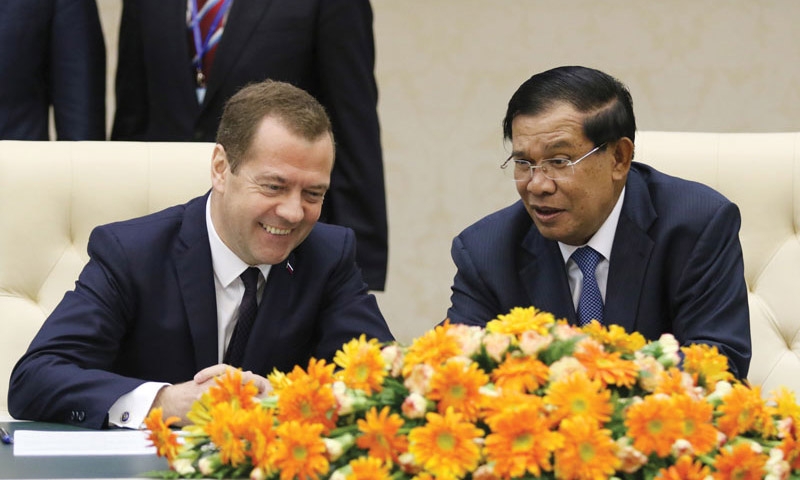រោងចក្រផលិតស៊ីម៉ង់ដ៍ធំបំផុតក្នុងខេត្តកំពង់ស្ពឺ តម្លៃជាង ២៥០លានដុល្លារ បើកដំណើរការជាផ្លូវការ
រោងចក្រផលិតស៊ីម៉ង់ដ៍ធំបំផុតមួយ តម្លៃជាង ២៥០លានដុល្លារ មានទីតាំងស្ថិតនៅស្រុកឱរ៉ាល់ ខេត្តកំពង់ស្ពឺ ត្រូវបានសម្ពោធដាក់ឱ្យដំណើរការជាផ្លូវការ ក្រោមអធិបតីភាពសម្តេចនាយករដ្ឋមន្រ្តី ហ៊ុន ម៉ាណែត នៅថ្ងៃទី២០ ខែឧសភា ឆ្នាំ២០២៥។ នាឱកាសនោះ សម្តេចនាយករដ្ឋមន្រ្តី បានថ្លែងសារទរ នូវសមិទ្ធផលរោងចក្រផលិតស៊ីម៉ងត៍ ក្រុមហ៊ុន Conch KT Cement ជាគម្រោងរោងចក្រស៊ីម៉ងត៍ខ្នាតធំទី២ ហើយអាចផលិតស៊ីម៉ងត៍ បានជាង ២លានតោនក្នុងមួយឆ្នាំៗ។ សម្តេចបន្តថា រោងចក្រស៊ីម៉ងត៍ខ្នាតធំមួយនេះ នឹងចូលរួមចំណែកក្នុងផ្គត់ផ្គង់ស៊ីម៉ង់ដ៍ក្នុងស្រុកដែលមានការកើនឡើងជាបន្តបន្ទាប់ ស្របតាមតម្រូវការស៊ីម៉ង់ដ៍ដែលកំពុងកើនឡើង។ បន្ថែមពីនេះ ឯកឧត្ដម កែវ រតនៈ រដ្ឋមន្រ្ដីក្រសួងរ៉ែ និងថាមពល បានឱ្យដឹងថា រោងចក្រផលិតស៊ីម៉ង់ដ៍ខាងលើនេះ មានទុនវិនិយោគប្រមាណជាង ២៥០លានដុល្លារ វិនិយោគដោយ ក្រុមហ៊ុនចិន Conch KT Cement ដែលបច្ចុប្បន្នក៏កំពុងដំណើររោងចក្រផលិតស៊ីម៉ងត៍មួយកន្លែងទៀតនៅក្នុងខេត្តបាត់ដំបងផងដែរ។ គួររំលឹកទៀតថា ក្រុមហ៊ុនចិន CONCH KT CEMENT (PHNOM PENH) COMPANY LIMITED […]
គម្រោងវិនិយោគថ្មីចំនួន១៣ មានទុន$៣១៨លាន កំពុងស្នើកម្ពុជាធ្វើការវិនិយោគនៅទីតាំងសំខាន់ៗទាំងនេះ
ក្នុងការអភិវឌ្ឍន៍ប្រកបដោយជោគជ័យសម្រាប់សេដ្ឋកិច្ចកម្ពុជា អ្នកវិនិយោគមួយក្រុមបានដាក់សំណើរសុំចុះបញ្ជីគម្រោងវិនិយោគដែលមានលក្ខណៈសម្បត្តិគ្រប់គ្រាន់ចំនួន១៣គម្រោង មានដើមទុនសរុបចំនួន ៣១៨លានដុល្លារ។ ពេលនេះក្រុមប្រឹក្សាអភិវឌ្ឍន៍កម្ពុជាកំពុងធ្វើការវាយតម្លៃយ៉ាងហ្មត់ចត់លើសំណើទាំងនេះ ដែលជាសញ្ញានៃការជំរុញសក្តានុពលដល់ទិដ្ឋភាពឧស្សាហកម្មរបស់ប្រទេសជាតិ។ ក្នុងកិច្ចប្រជុំកាលពីថ្ងៃទី១២ ខែឧសភា ឯកឧត្តម ជា វុទ្ធី អគ្គលេខាធិការនៃគណៈកម្មាធិការវិនិយោគកម្ពុជា បានលើកឡើងពីសារៈសំខាន់នៃកិច្ចពិភាក្សានេះ ដែលផ្តោតលើការស្នើសុំចុះបញ្ជីគម្រោងវិនិយោគថ្មីចំនួន១២ និងគម្រោងពង្រីកបន្ថែមចំនួន១។ គួរកត់សម្គាល់ថា គម្រោងពង្រីកបន្ថែមនេះមានប្រតិបត្តិការរុករករ៉ែដែកក្នុងខេត្តកំពត។ សំណើវិនិយោគទាំងអស់ខាងលើនេះ ត្រូវបានគេរំពឹងថានឹងអាចបង្កើតការងារបានប្រមាណ ៧៣០០កន្លែង នៅទូទាំងវិស័យផ្សេងៗដូចជា៖ ការផលិតឧបករណ៍ហ្គេម សម្ភារៈផ្លាស្ទិច និងលោហៈ ការផ្គត់ផ្គង់សម្អាត គ្រឿងប្រើប្រាស់ក្នុងផ្ទះ និងសម្ភារៈផ្ទះបាយ និងគ្រឿងបង្គុំអគ្គីសនី។ល។ ក្នុងចំណោមគម្រោងទាំងអស់នេះ ឃើញថាមានគម្រោងដ៏លេចធ្លោមួយគឺការបង្កើតស្ថានីយ៍ថាមពលខ្យល់ ១៥០មេហ្គាវ៉ាត់ ដែលនឹងរួមចំណែកយ៉ាងសំខាន់ដល់សមត្ថភាពថាមពលកកើតឡើងវិញរបស់កម្ពុជា។ គម្រោងដែលបានស្នើឡើងទាំងអស់នេះ គ្រោងបោះទីតាំងវិនិយោគនៅក្នុងខេត្តកណ្តាល កំពង់ស្ពឺ តាកែវ កំពត និងមណ្ឌលគិរី ស្របតាមគោលដៅរបស់រដ្ឋាភិបាលក្នុងការជំរុញការអភិវឌ្ឍន៍សេដ្ឋកិច្ចក្នុងតំបន់។ ចំណាប់អារម្មណ៍របស់វិនិយោគិននៅកម្ពុជាបន្តកើនឡើង ដែលឆ្លុះបញ្ចាំងពីទំនុកចិត្តលើសក្តានុពលសេដ្ឋកិច្ចរបស់ប្រទេស និងការប្តេជ្ញាចិត្តក្នុងការបង្កើតបរិយាកាសអំណោយផលសម្រាប់អាជីវកម្ម និងការបង្កើតការងារ។ - Video Advertisement -
៤ខែនេះ កម្ពុជាទទួលបានវិនិយោគថ្មីចំនួន ២៣១គម្រោង, ទុនសរុប $៣,៤ពាន់លាន កើន៣៤%
ត្រឹមរយៈពេល ៤ខែដើមឆ្នាំ២០២៥ ក្រុមប្រឹក្សាអភិវឌ្ឍន៍កម្ពុជាបានអនុម័តគម្រោងវិនិយោគសរុបចំនួន ២៣១គម្រោង ក្រោមទុនវិនិយោគប្រមាណ ៣,៤ពាន់លានដុល្លារ។ បើធៀបរយៈពេលដូចគ្នានឹងឆ្នាំ២០២៤ កើនឡើង ១០៣គម្រោង ស្មើនឹងប្រមាណ ៨០% ខណៈទុនវិនិយោគក៏បានកើតឡើងប្រមាណជាង ៨៥៦លានដុល្លារ ស្មើនឹងប្រមាណ ៣៤% ផងដែរ។ នេះបើយោងតាមសេចក្តីប្រកាសព័ត៌មានរបស់ក្រុមប្រឹក្សាអភិវឌ្ឍន៍កម្ពុជា ដែលចេញផ្សាយនៅថ្ងៃទី០៦ ខែឧសភា ឆ្នាំ២០២៥។ ក្នុងប្រភពដដែលបានបង្ហាញទៀតថា សម្រាប់ខែមេសាតែមួយ មានគម្រោងវិនិយោគចំនួន ៥៩ ដែលមានទុនវិនិយោគសរុបប្រមាណ ៨៦០លានដុល្លារ ត្រូវបានអនុម័តដោយក្រុមប្រឹក្សាអភិវឌ្ឍន៍កម្ពុជា។ គម្រោងទាំងនេះ ត្រូវបានគេរំពឹងថា នឹងអាចបង្កើតការងារបានប្រមាណ ៣៩ពាន់កន្លែង។ គួរបញ្ជាក់ថា ក្នុងចំណោមគម្រោងវិនិយោគសរុបទាំង៥៩នេះ គម្រោងវិនិយោគដែលមានទីតាំងស្ថិតនៅក្រៅតំបន់សេដ្ឋកិច្ចពិសេសមានចំនួន ៣២គម្រោង និងគម្រោងវិនិយោគដែលមានទីតាំងស្ថិតនៅក្នុងតំបន់សេដ្ឋកិច្ចពិសេស មានចំនួន ២៧គម្រោង។ បើធៀបនឹងឆ្នាំ២០២៤ ក្នុងខែដដែលនេះ ការអនុម័តគម្រោងវិនិយោគមានការកើនឡើងចំនួន ៣៧គម្រោង ស្មើនឹងប្រមាណ១៦៨% ខណៈទុនវិនិយោគមានការកើនឡើងប្រមាណជាង ៥៥០លានដុល្លារ ស្មើនឹងប្រមាណ ១៧៨%។ ជាការកត់សម្គាល់ ឃើញថាវិស័យឧស្សាហកម្មបាននាំមុខគេក្នុងការស្រូបទាញទុនវិនិយោគបានរហូតដល់ ៧៦៧លានដុល្លារ តាមពីក្រោយដោយវិស័យហេដ្ឋារចនាសម្ព័ន្ធចំនួន ៧៣លានដុល្លារ និងវិស័យទេសចរណ៍មានចំនួន ២០លានដុល្លារ។ បើក្រឡេកមើលលំហូរវិនិយោគពីបរទេស […]
ក្រុមហ៊ុនបច្ចេកវិទ្យាឈានមុខគេមកពីតៃវ៉ាន់ ចង់មកវិនិយោគលើវិស័យ១នេះនៅកម្ពុជា
នៅក្នុងការអភិវឌ្ឍន៍ដ៏សំខាន់មួយសម្រាប់ទិដ្ឋភាពបច្ចេកវិទ្យារបស់ប្រទេសកម្ពុជា ក្រុមហ៊ុន ADATA Technology Co., Ltd. ដែលជាក្រុមហ៊ុនបច្ចេកវិទ្យាឈានមុខគេរបស់តៃវ៉ាន់បានបង្ហាញពីចំណាប់អារម្មណ៍របស់ខ្លួនជាផ្លូវការក្នុងការវិនិយោគលើវិស័យបច្ចេកវិទ្យាទំនើបនៅកម្ពុជា។ ការប្រកាសនេះធ្វើឡើងក្នុងជំនួបរវាងលោក ហ៊ុន ម៉ាណែត នាយករដ្ឋមន្ត្រីកម្ពុជា និងលោក CHEN Simon ប្រធាន ADATA ដែលប្រព្រឹត្តទៅនៅថ្ងៃទី៣០ ខែមេសា ឆ្នាំ២០២៥។ ក្នុងកិច្ចពិភាក្សារបស់ពួកគេ លោក CHEN Simon បានលើកឡើងពីកិច្ចខិតខំប្រឹងប្រែងរបស់ក្រុមហ៊ុន មិនត្រឹមតែការវិនិយោគប៉ុណ្ណោះទេ ប៉ុន្តែថែមទាំងចង់សហការជាមួយក្រសួង ស្ថាប័ននានារបស់កម្ពុជា ដើម្បីបង្កើនការបណ្តុះបណ្តាល និងការអភិវឌ្ឍធនធានមនុស្សក្នុងវិស័យបច្ចេកវិទ្យាទំនើបថែមទៀតផង។ ការផ្តោតជាយុទ្ធសាស្ត្រនេះ មានគោលបំណងចង់លើកកម្ពស់សមត្ថភាពរបស់កម្ពុជាក្នុងវិស័យបច្ចេកវិទ្យានាយុគសម័យថ្មីនេះ។ ជាការឆ្លើយតប សម្តេចធិបតី បានស្វាគមន៍ ក្រុមហ៊ុនដែលចាប់អារម្មណ៍វិនិយោគនៅកម្ពុជា ខណៈសម្តេចថា ការអភិវឌ្ឍវិស័យបច្ចេកវិទ្យានៅកម្ពុជា គឺជាវិស័យអាទិភាពមួយរបស់រាជរដ្ឋាភិបាល។ ទន្ទឹមគ្នានេះដែរ សម្តេច ក៏បានលើកទឹកចិត្តឱ្យក្រុមហ៊ុនបន្តភ្ជាប់ទំនាក់ទំនងជាមួយក្រសួងពាក់ព័ន្ធបន្ថែមទៀត ដើម្បីចាប់យកឱកាសវិនិយោគនៅកម្ពុជា។ គួររម្លឹកថា កាលថ្ងៃទី១៤ ខែធ្នូ ឆ្នាំ២០២៣ ក្រុមហ៊ុនរបស់តៃវ៉ាន់ ADATA Technology Co., Ltd ធ្លាប់បានប្រកាសពីគម្រោងវិនិយោគរបស់ខ្លួនម្តងរួមមកហើយ ដែលគម្រោងនោះមានតម្លៃដល់ជាង ១០០លានដុល្លារ ក្នុងការសាងសង់រោងចក្រសម្រាប់ផលិតផលអេឡិចត្រូនិកជាច្រើនប្រភេទនៅប្រទេសកម្ពុជា។ […]
ក្នុងត្រីមាសទី១-២០២៥ ចំនួនសហគ្រាសគ្រឹះស្ថាននៅកម្ពុជាបានកើនដល់ជាង ៤ម៉ឺន៥ពាន់សហគ្រាស
នៅក្នុងសញ្ញាជាវិជ្ជមានមួយសម្រាប់សេដ្ឋកិច្ចកម្ពុជាបានបង្ហាញថា ចំនួនសហគ្រាស និងគ្រឹះស្ថានបានកើនឡើងដល់ ៤៥.២៥៥សហគ្រាស នៅក្នុងត្រីមាសទីមួយនៃឆ្នាំ២០២៥ នេះជាការឆ្លុះបញ្ចាំងពីកំណើននៃចំនួនអាជីវកម្ម ៤៥៧ ធៀបនឹងត្រីមាសមុន។ ការកើនឡើងនេះត្រូវបានបំពេញបន្ថែមដោយការកើនឡើងនៃកម្លាំងពលកម្មចំនួន ១.៨៤៦.៨៣៧នាក់ មានការកើនឡើងចំនួន ៣០.៧៩១នាក់។ នេះបើយោងតាមសារលិខិតរបស់សម្តេចធិបតី ហ៊ុន ម៉ាណែត នាយករដ្ឋមន្ត្រី នៃព្រះរាជាណាចក្រកម្ពុជា ក្នុងឱកាសខួបអនុស្សាវរីយ៍លើកទី១៣៩ នៃទិវាពលកម្មអន្តរជាតិ ថ្ងៃទី១ ខែឧសភា ឆ្នាំ២០២៥។ សម្តេចបានគូសបញ្ជាក់ថា ក្នុងរយៈពេលដូចគ្នានេះ ក្រុមប្រឹក្សាអភិវឌ្ឍន៍កម្ពុជាបានចុះបញ្ជីគម្រោងវិនិយោគសរុបចំនួន ១៧២គម្រោង ដែលមានទុនវិនិយោគសរុបប្រមាណ ២,៥ពាន់លានដុល្លារ និងអាចបង្កើតការងារបានចំនួន ប្រមាណជិត ១២ម៉ឺនកន្លែង ក្នុងនោះគម្រោងពង្រីកផលិតកម្មមានចំនួន ៦គម្រោង។ (អានបន្ថែម) សម្តេចបានរំលឹកឡើងវិញនូវការប្តេជ្ញាចិត្តរបស់រាជរដ្ឋាភិបាលក្នុងការជំរុញបរិយាកាសអំណោយផលដល់កំណើនអាជីវកម្ម និងការច្នៃប្រឌិត។ សម្តេចបានគូសបញ្ជាក់អំពីសារៈសំខាន់នៃការប្រកាន់ខ្ជាប់នូវច្បាប់ការងារ ច្បាប់សហជីព ច្បាប់សន្តិសុខសង្គម និងច្បាប់ស្តីពីប្រាក់ឈ្នួលអប្បបរមា រួមនឹងស្តង់ដារការងារអន្តរជាតិ ដើម្បីបង្កើនទិដ្ឋភាពវិជ្ជាជីវៈនៅកម្ពុជា។ នៅពេលដែលប្រទេសកម្ពុជាទទួលបាននូវវឌ្ឍនភាពគួរឱ្យកត់សម្គាល់បែបនេះ រដ្ឋាភិបាលកម្ពុជានៅតែយកចិត្តទុកដាក់ក្នុងការជំរុញក្របខណ្ឌសេដ្ឋកិច្ចដែលរីកចម្រើន និងការពារសិទ្ធិកម្មករ ដោយចង្អុលបង្ហាញពីអនាគតដ៏ភ្លឺស្វាងសម្រាប់ទាំងសហគ្រាស និងកម្លាំងពលកម្ម។ - Video Advertisement -
ជប៉ុនប្រកាសសង់រោងចក្រអគ្គិសនីជីវម៉ាសកម្លាំង ៥០MW នៅកំពង់ស្ពឺ ក្នុងខែមិថុនា ២០២៥
ក្រុមហ៊ុន erex Co., Ltd. ដែលជាក្រុមហ៊ុនវិនិយោគជប៉ុនដ៏លេចធ្លោមួយបានប្រកាសពីគម្រោងសាងសង់រោងចក្រថាមពលជីវម៉ាស់ ៥០MW នៅខេត្តកំពង់ស្ពឺ ដោយគ្រោងនឹងចាប់ផ្តើមសាងសង់នៅខែមិថុនា ឆ្នាំ ២០២៥ នេះ។ គម្រោងដ៏មានមហិច្ឆតានេះមានគោលបំណងជំរុញការផ្គត់ផ្គង់ថាមពលក្នុងតំបន់ និងរួមចំណែកដល់ការផ្គត់ផ្គង់អគ្គិសនីដែលមានតម្លៃសមរម្យសម្រាប់ខេត្តកំពង់ស្ពឺ និងតំបន់ជិតខាង។ នាពេលបច្ចុប្បន្ន ក្រុមហ៊ុនខាងលើនេះ ក៏កំពុងសង់រោងចក្រអគ្គិសនីសូឡាដែលមានកម្លាំង ៤០MW នៅខេត្តពោធិ៍សាត់ ដោយគ្រោងនឹងដាក់ឱ្យដំណើរការនៅឆ្នាំ២០២៦ ផងដែរ។ នេះបើតាមជំនួបរវាង ឯកឧត្តម ទុយ រី ឯកអគ្គរាជទូតកម្ពុជាប្រចាំប្រទេសជប៉ុន និងឯកឧត្តម IMAMURA Masahiro អតីតប្រធានសម្ព័ន្ធមិត្តភាពសភាកម្ពុជា-ជប៉ុន និងជាទីប្រឹក្សានាយករដ្ឋមន្រ្តី នៅថ្ងៃទី២៨ ខែមេសា ឆ្នាំ២០២៥។ កិច្ចប្រជុំនេះបានផ្តោតលើការជំរុញកិច្ចសហប្រតិបត្តិការទ្វេភាគីក្នុងការអភិវឌ្ឍន៍ថាមពល។ លោក HITOSHI HONNA ម្ចាស់ក្រុមហ៊ុន និងលោក TOMOKI KAKUTA អ្នកគ្រប់គ្រងក្រុមហ៊ុន erex បានឱ្យដឹងថា គម្រោងអភិវឌ្ឍន៍ថាមពលអគ្គិសនីសូឡាកម្លាំង ៤០MW នៅខេត្តពោធិសាត់ នឹងត្រូវបញ្ចប់ការសាងសង់ និងដាក់ឱ្យដំណើការនៅឆ្នាំ២០២៦ ក្រោយទទួលបានការអនុញ្ញាតពីរាជរដ្ឋាភិបាលកម្ពុជាកាលពីឆ្នាំ២០២៤។ លោកបានបន្ថែមថា គម្រោងសង់រោងចក្រអគ្គិសនីបាយអូម៉ាស់ ( Biomass) […]



 English
English







